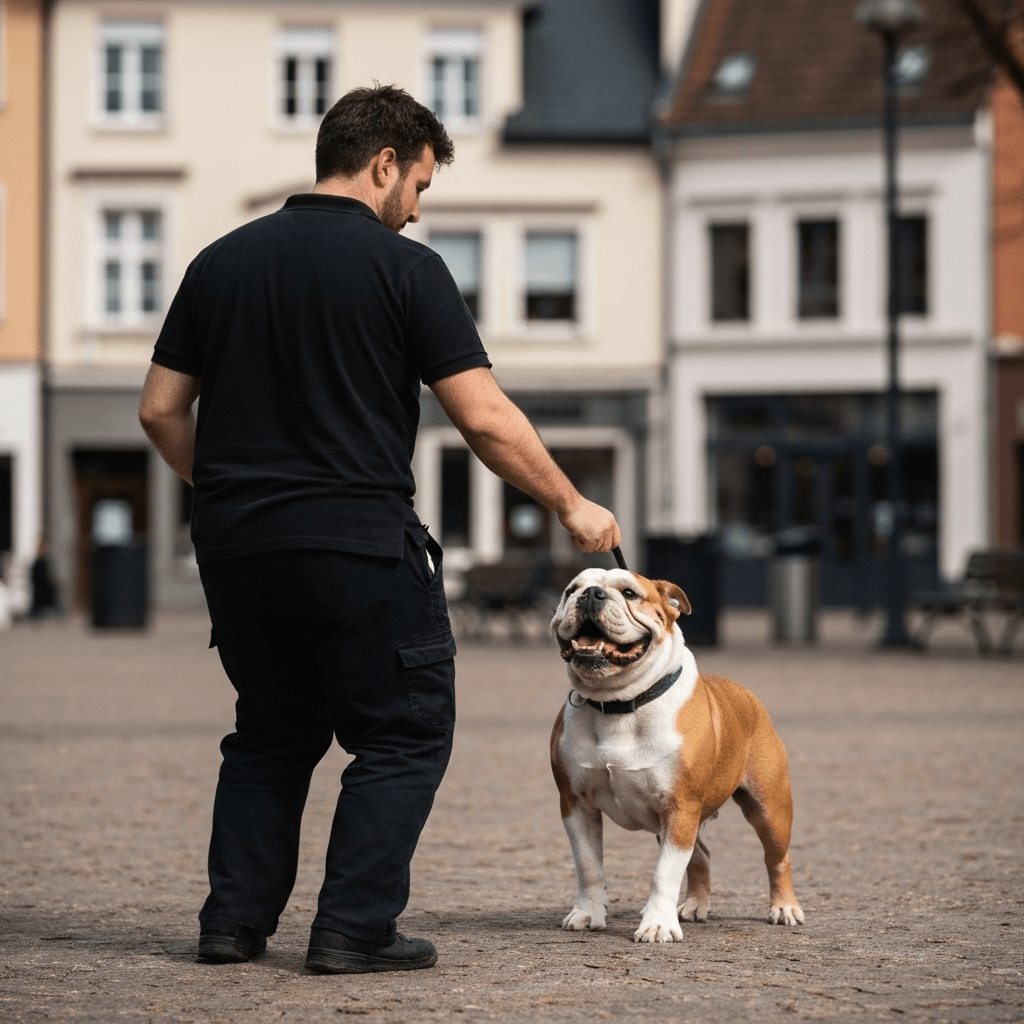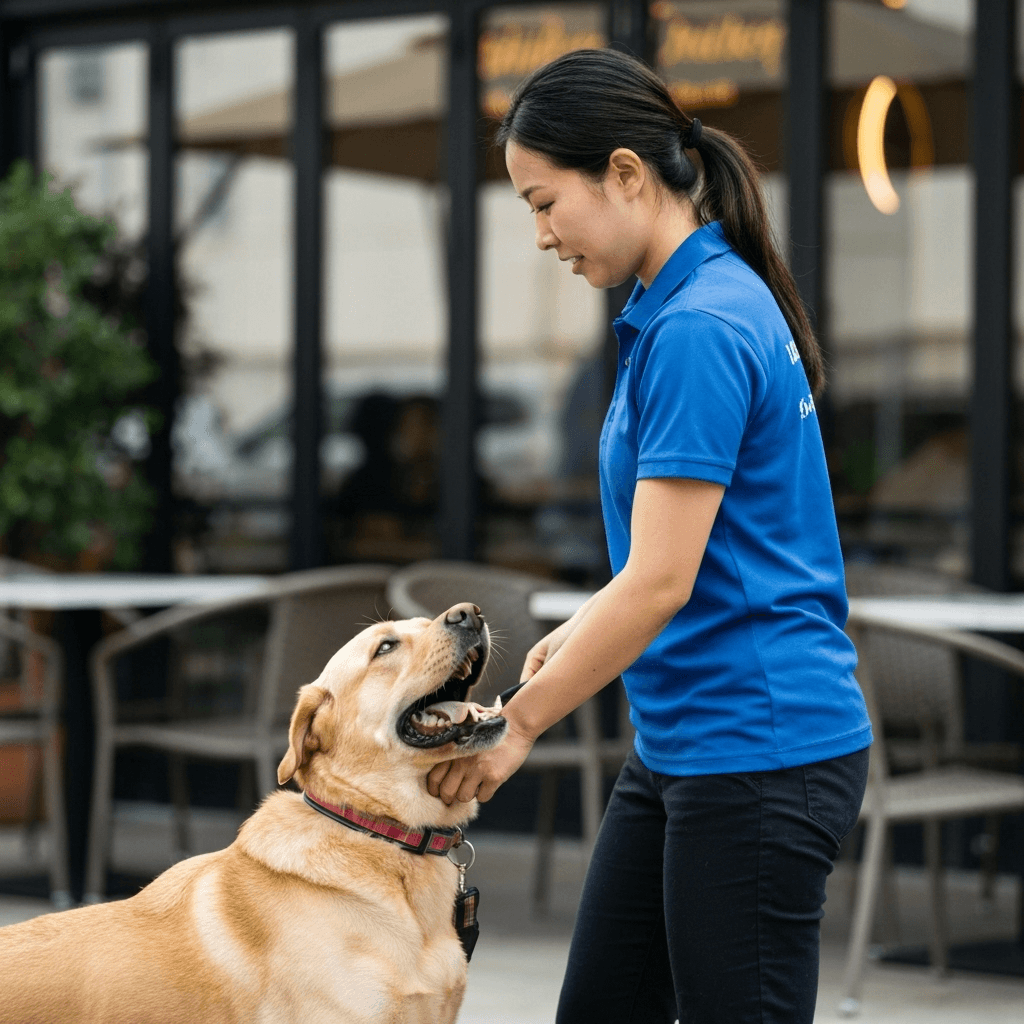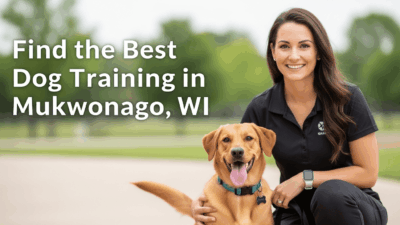Your Complete Guide to Choosing a Dog Trainer in Mukwonago
Living with a dog in Mukwonago means you’ll likely spend time walking around Phantom Lake, strolling down Main Street, and visiting places like Field Park or the Fox River trails. Your dog needs to handle all of these situations calmly and politely, which is where good training comes in.
The right training helps your dog settle at home, walk nicely past other dogs, and listen even when there are distractions at parks or community events. It’s about making your daily life together easier and more enjoyable.
How to Choose the Right Trainer
When you’re looking for a trainer, focus on finding someone who uses positive reinforcement methods. These approaches build your dog’s confidence and focus without using fear or intimidation, which makes it much easier to follow village rules about keeping dogs under control in public spaces.
Credentials can help you understand what kind of experience and education a trainer has. Common dog trainer certifications include KPA-CTP and CPDT-KA. If your dog has more complex behavior issues, look for trainers with IAABC-CDBC or CBCC-KA certifications, which show they have specialized knowledge about behavior problems.
Think about whether you want in-home coaching or group classes. In-home training works really well for issues like door manners, reactivity in your yard, and neighborhood leash skills. Group classes around Waukesha County can be great once your dog can focus around other dogs without getting too excited or stressed.
Before you commit to any program, ask how they measure progress, what kind of practice you’ll need to do between sessions, and whether they offer a free consultation to see if it’s a good fit.
Common Dog Training Methods Explained

The best training methods are based on rewards, which makes it easier for your dog to use their new skills everywhere from your living room to busy Mukwonago sidewalks and parks.
Basic obedience covers the essentials like sit, down, stay, come, leash skills, and polite greetings. These are the skills you’ll use every day around town. Puppy training focuses on socialization, potty training, getting comfortable with a crate, and early leash training so good habits start right away.
Behavior modification is more specialized work for dogs with reactivity, fear, or separation anxiety. This involves careful desensitization and counterconditioning, which basically means helping your dog learn new, positive associations with things that currently stress them out.
You can choose between private lessons and in-home dog training that work around your schedule and address problems in your actual environment. Group classes add controlled distractions once your dog is ready for that challenge. Day training can speed up the learning process when you’re short on time – the trainer works with your dog, then teaches you what they’ve learned.
Board and train programs can be helpful for specific goals, but make sure you understand exactly what’s included. Facilities that house dogs for payment generally need state oversight through DATCP – you can learn more about Wisconsin’s program at this DATCP licensing page.
Some dogs might be good candidates for specialized training like therapy dog work or service dog training, but these require very clear public-access skills and careful screening. Always avoid trainers who use fear or pain-based methods – humane approaches are safer, create longer-lasting results, and fit with what most communities expect.
Average Cost of Dog Training in Mukwonago (Updated for 2025)
Training costs around Mukwonago and Waukesha County depend on the trainer’s experience, how long sessions are, and where they’re held. Here’s what you can expect to pay based on current pricing across the Milwaukee metro and nearby towns:
| Service Type | Average Cost (Mukwonago/Waukesha County) |
|---|---|
| Puppy classes, 4–6 weeks | $150–$275 total |
| Group obedience classes, 4–6 weeks | $160–$300 total |
| Private lessons, 60–90 minutes | $110–$185 per visit |
| In-home coaching packages, 4–6 visits | $450–$900 total |
| Day training, trainer works your dog | $450–$950 per week |
| Behavior consult, first visit | $150–$250 |
| Board and train, 2–4 weeks | $2,100–$4,500 total |
You might pay extra travel fees if the trainer has to drive longer distances within the county, and expect higher prices for reactivity or aggression work since these require specialized skills. Always ask for clear goals, what’s included in the price, and how you’ll track your dog’s progress.
Questions to Ask a Potential Dog Trainer
Here are the important questions to ask before you choose a trainer:
- What methods do you use, and how do you keep sessions low-stress and reward-based?
- What credentials do you hold, such as KPA-CTP or CPDT-KA, and do you pursue ongoing education like CTC or IAABC programs?
- How will you tailor the plan to my home, neighborhood, and weekly routine in Mukwonago?
- Do you offer private lessons, group classes, or day training, and which fits my goals?
- How will we measure progress and decide when to add distractions?
- What are the total costs, including travel fees and any cancellations?
- Do you carry liability insurance, and can you share proof?
- If we train in Waukesha County parks, do you have any required permits or insurance on file?
- For behavior issues, do you coordinate with my veterinarian if needed?
- Do you offer a written plan, homework, or a free evaluation before enrollment?
Local Rules and Considerations for Mukwonago
Mukwonago sits mainly in Waukesha County with a small portion in Walworth County. Most residents follow village and county guidelines that are designed to keep public spaces safe and pleasant for everyone.
Your dog must be under control and on leash in public areas unless you’re inside a designated off-leash dog exercise area. A standard 6-foot leash works best for sidewalks, community events, and parks.
Wisconsin requires current rabies vaccination and a rabies tag for all dogs. You can find state guidance and resources at the Department of Health Services page: Wisconsin DHS Rabies.
You’ll also need to get an annual dog license through your municipality and keep both the license and rabies tags on your dog’s collar. Excessive barking can be considered a nuisance, so if your dog has issues with alert barking, yard reactivity, or being alone, a trainer can help you manage these problems before they become a neighbor complaint.
If you want to use Waukesha County’s off-leash areas, you’ll need a Dog Exercise Area permit and park admission. You can find details and rules on the county’s page: Waukesha County Dog Exercise Areas.
Dog trainers don’t need a special state license to teach, but facilities that board or house dogs for payment may need a state license through DATCP. While Wisconsin law doesn’t require insurance for dog trainers, most professional trainers carry commercial general liability insurance, and some parks or municipalities require proof of insurance for commercial use of their facilities.
Local Mukwonago Resources for Dog Owners
The Waukesha County Park System has several great options for dog owners. Mukwonago Park Dog Exercise Area offers fenced off-leash areas, though you’ll need a permit and park admission. Minooka Park Dog Exercise Area has multiple fenced zones, which is nice for practicing at different distraction levels. Nashotah Park Dog Exercise Area provides spacious off-leash fields with clearly posted rules and etiquette guidelines.
Always check the posted rules, bring proof of your permits, and make sure your dog has solid recall and polite greeting skills before using these areas.
Where to Practice in Mukwonago and Surrounding Areas
Field Park, the Fox River Trail, and neighborhood sidewalks are perfect for real-world training. These spots let you practice loose-leash walking and calm focus in actual situations you’ll encounter regularly.
Keep your dog leashed, give space to other people and dogs, and try to train during quieter times when you’re just starting out. This helps your dog succeed and makes the experience positive for everyone.

Common Questions
How much does in-home dog training cost?
Most Mukwonago owners pay between $110 and $185 per visit for in-home training. Multi-session packages usually offer better value, and complex behavior work typically costs more.
Is in-home dog training worth it?
Yes, especially for many common issues. You can work on problems exactly where they happen, then practice generalizing those skills to local sidewalks, parks, and busier spots around town.
Can you pay someone to house train your dog?
Yes, many trainers offer puppy programs that include potty training, crate routines, and schedules. Day training can speed up the process since the trainer works with your dog regularly and then teaches you the system.
What is the 3-3-3 rule for dog training?
This rule suggests planning for about 3 days for your dog to decompress in a new situation, 3 weeks to learn new routines, and 3 months to feel fully settled. Good training plans should account for this timeline.
How long will it take to reach my training goals?
Most friendly dogs show solid progress in 4 to 8 weeks with daily practice. Dogs with reactivity, fear, or aggression often need several months of structured behavior modification work.
What should I bring to group classes?
Bring a flat collar or harness, a 6-foot leash, high-value treats, water, and vaccination records if the trainer requests them. Skip retractable leashes since they can be unsafe in group settings.
What’s the leash law in Mukwonago?
You need to use a leash in public spaces unless you’re inside a designated off-leash area. Keep your dog under control and always pick up waste.
Do I need a dog license in Mukwonago or Waukesha County?
Yes, Wisconsin requires annual dog licensing through your municipality and a current rabies tag. Keep both tags on your dog’s collar at all times.
What shots does my dog need in Waukesha County or Wisconsin?
Rabies vaccination is required statewide. Your vet may recommend other vaccines like distemper-parvo and bordetella based on your dog’s lifestyle and risk factors.
Are dog trainers required to be licensed in Wisconsin?
There’s no special trainer license requirement. However, if a business boards or houses dogs for payment, it may need a state license through DATCP’s Dog Seller and Facility program.
Where can I practice off-leash recall?
Use the fenced county dog exercise areas like those at Mukwonago Park, Minooka Park, or Nashotah Park. Try to visit during quieter hours when you’re building new skills.
Which dog parks allow training around Mukwonago?
Waukesha County’s fenced dog exercise areas permit off-leash activity within their posted rules. Keep your training sessions respectful and give space to other users.
What beaches and trails allow dogs for training?
Leashed dogs are welcome on many local multi-use trails and neighborhood paths. Keep a 6-foot leash, yield space to others, and avoid high-traffic times until your dog can stay calm around distractions.
Do Waukesha County dog areas require a permit?
Yes, county dog exercise areas require a Dog Exercise Area permit and park admission. Check the county’s rules and current pricing at the Dog Exercise Areas page linked above.
Finding the right trainer and being consistent with practice around Mukwonago’s parks and neighborhoods will help your dog become a well-behaved companion you can take anywhere. When you’re comparing trainers, ask about their credentials, confirm they have insurance, and make sure their approach fits your goals and daily routine.
